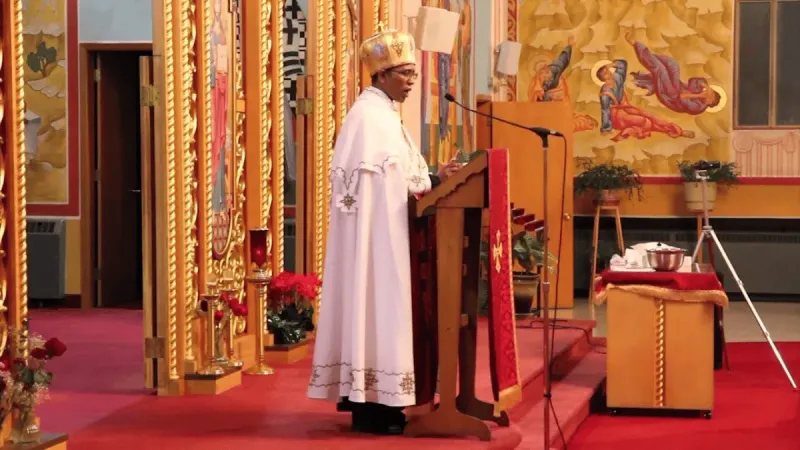
Denver, Colo., Dec 29, 2022 / 16:00 pm (CNA).
After more than two months in detention in Eritrea, Bishop Fikremariam Hagos Tsalim and Father Mehereteab Stefanos have been released, several sources reported Thursday.
The 52-year-old bishop heads the Eritrean Catholic Eparchy of Segheneity. Father Stefanos, before his imprisonment, was a parish priest at St. Michael’s Parish in the same eparchy. It is still unknown whether another priest, Capuchin Friar Abbot Abraham, has been released.
Security agents had arrested Bishop Tsalim and two priests Oct. 15 at Asmara International Airport upon the bishop’s arrival from Europe. The three clergymen were detained at Adi Abeto prison, according to Agenzia Fides.
The two released prisoners were welcomed by a group that included Archbishop Menghesteab Tesfamariam of Asmara, head of the Eritrean Catholic Church, BBC News reports.
Catholics make up about 4% of Eritrea’s 6 million people. The Eritrean Catholic Church is one of the 23 Eastern Catholic Churches in full communion with the Holy See. It has an estimated 168,000 members in the northwestern African country and in diaspora communities around the world.
Authorities did not state a reason for the arrests of the three clergymen, BBC News reports.
The three detained clergy were accused of criticizing human rights violations in their homilies, CNA’s sister agency ACI Africa reported in October, citing a source who did not want to be named for security reasons. The objects of their criticism included the forced military enlistment of young people and evictions and confiscation of property of those who refused to go to war.
The release of the bishop and the priest comes amid agreements to end the civil war in Ethiopia, where the Eritrean government has sided with the Ethiopian government against the regional leaders of the Tigray province.
Critics of the bishop’s arrest included the U.K.-based groups Christian Solidarity Worldwide and Human Rights Concern-Eritrea.
Eritrea has aligned with the Ethiopian government’s war against the Tigray People’s Liberation Front. This group’s leaders dominated Ethiopian politics for decades but the group now controls the Ethiopian region of Tigray, on the southern border of Eritrea. Since the war began in November 2020, the conflict has killed thousands of people. Hundreds of thousands of people have been put at risk of famine and millions of people have been displaced from their homes.
On Nov. 2 the Ethiopian government and Tigrayan forces signed a peace agreement to permanently end hostilities. Both parties also signed a Nov. 12 agreement concerning disarmament, humanitarian access and the Ethiopian military’s entry, Reuters reports. They are now discussing the withdrawal of Eritrean troops from Tigray.
Eritrea became independent from Ethiopia in 1991. Since then, the country has not held a national election. Its president, President Isaias Afwerki, has held office since independence.
Only four religious communities are legal in the country: the Coptic Orthodox Church of Eritrea, Sunni Islam, the Catholic Church, and the Lutheran-affiliated Evangelical Church of Eritrea.
Even legal groups face persecution. The Eritrean government has periodically targeted Catholic and other religious institutions.
In August, the Eritrean government took over the Hagaz Agro-Technical School, a Catholic institution founded and run by the Lasallian Brothers. The school trains students in farm machinery, agriculture, soil conservation, and animal husbandry.
Government officials shut down several Catholic-run schools and hospitals in 2019, saying religious bodies could not run these institutions, BBC News reports. Their legal pretext is a 1995 regulation that restricts social projects and welfare projects to the state. The regulation has been used intermittently to limit religious institutions’ activities and to pursue perceived critics of the government.
Eritrea’s Catholic bishops have opposed the application of the regulation, arguing that the Church’s social services are not in opposition to the government.
The government has drawn international criticism, including a May letter sent to Estifanos Habtemariam Ghebreyesus, the Eritrean ambassador in the United Kingdom and Ireland.
In that letter, officials of Christian Solidarity Worldwide, Church in Chains-Ireland, Release Eritrea, Human Rights Concern-Eritrea, and the Eritrean Orthodox Church in the United Kingdom highlighted multiple instances of human rights violations. These included forced conscription of minors and “unjust, arbitrary and indefinite detention” of tens of thousands of citizens who are imprisoned in “harsh conditions.” Hundreds of Christians are imprisoned “solely on account of their faith.”
The U.S. Commission on International Religious Freedom, an advisory body to the U.S. government, has said that Eritrea has “one of the worst religious freedom records in Africa.”
Since 2004 the U.S. State Department has designated Eritrea as a Country of Particular Concern for its religious freedom abuses.
If you value the news and views Catholic World Report provides, please consider donating to support our efforts. Your contribution will help us continue to make CWR available to all readers worldwide for free, without a subscription. Thank you for your generosity!
Click here for more information on donating to CWR. Click here to sign up for our newsletter.




Leave a Reply